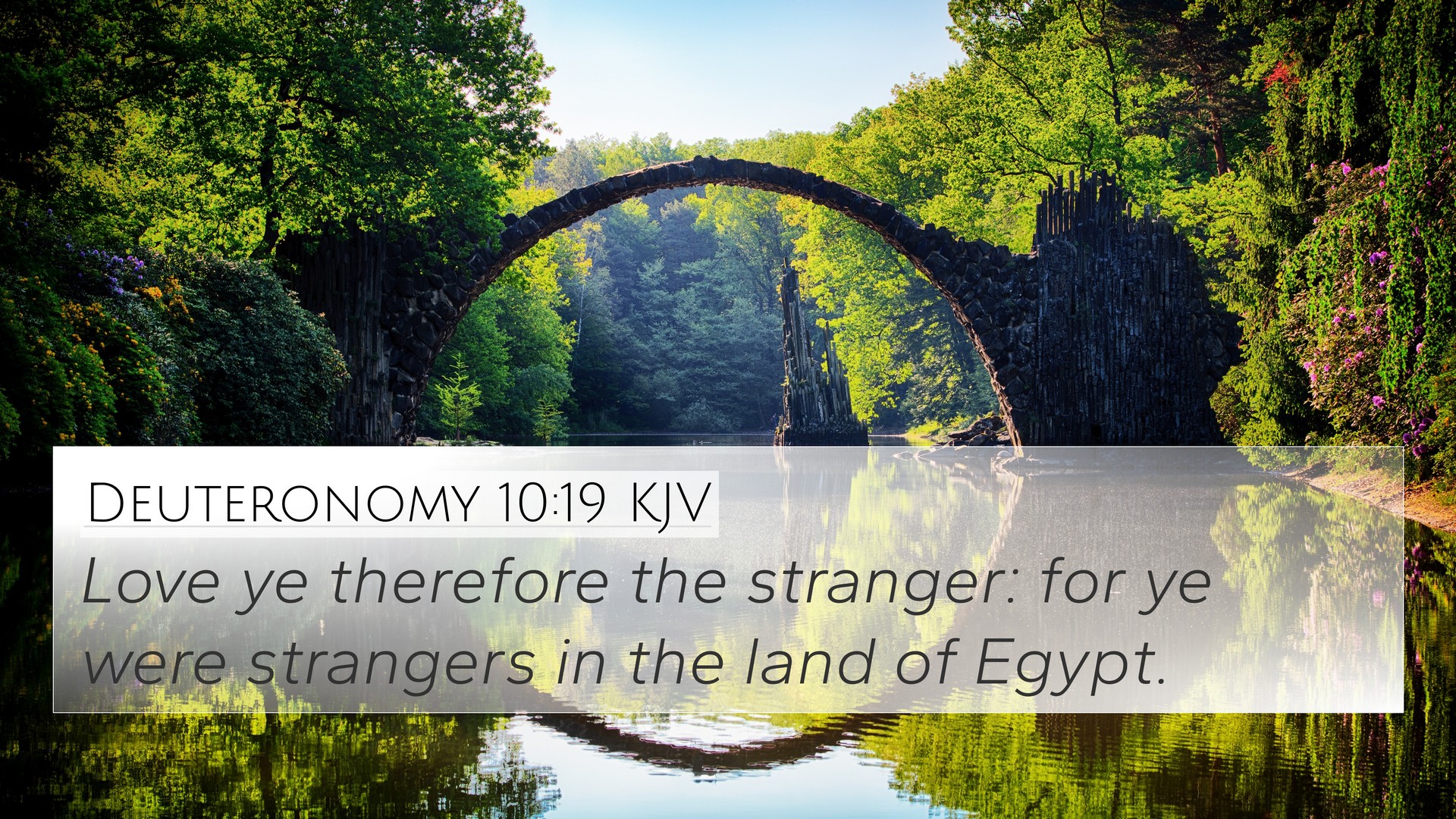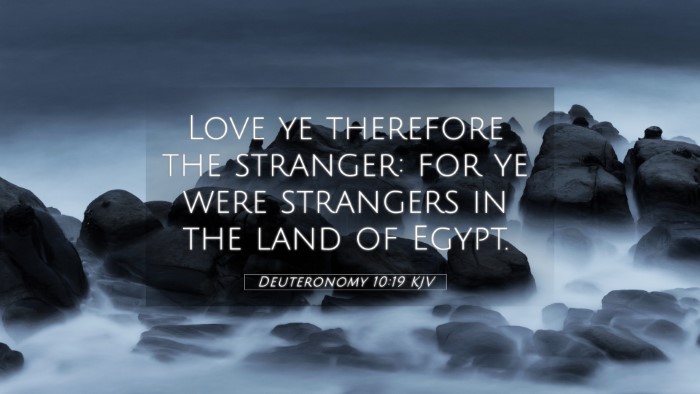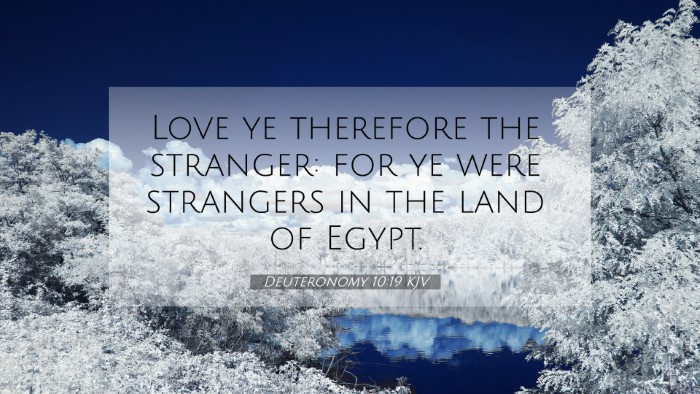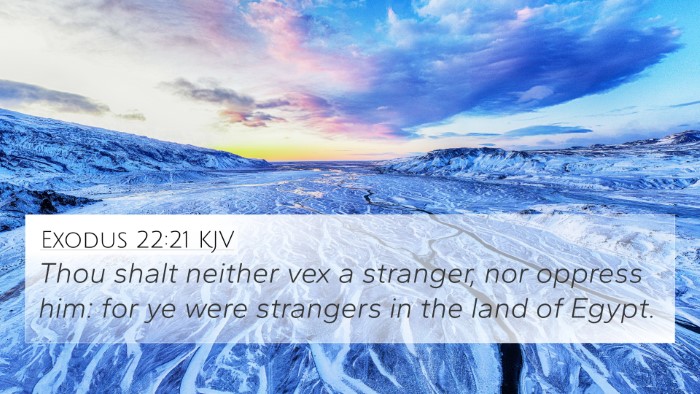Meaning and Interpretation of Deuteronomy 10:19
Deuteronomy 10:19 states, "Love ye therefore the stranger: for ye were strangers in the land of Egypt: I am the LORD your God." This verse conveys a significant command that reflects the character of God and emphasizes the importance of compassion and love towards others, particularly the vulnerable and the marginalized.
Key Themes
- Love and Compassion: The verse calls for love towards strangers, indicating a moral obligation to care for those in need.
- Remembrance of History: The reference to their previous status as strangers in Egypt serves as a reminder of God's deliverance and their responsibility to act justly.
- Divine Authority: The statement "I am the LORD your God" underscores God's sovereignty and the expectation that His people follow His commandments.
Commentary Insights
In the commentaries of Matthew Henry, the emphasis is placed on the necessity of showing kindness to strangers, as it reflects God’s own merciful nature. Henry suggests that remembering their history as strangers should compel the Israelites to extend grace to others.
Albert Barnes points out that this verse is foundational for social ethics within the community of Israel, rooting the commandment in the existential experience of the Israelites. He implies that loving strangers is not just a social nicety but a divine directive rooted in their history.
Meanwhile, Adam Clarke elaborates on the spiritual implications of this command. He notes that to love the stranger is to demonstrate true spirituality, as it reflects the nature of God's love, which is inclusive and boundless.
Bible Cross-References
This verse connects with various other scriptures that deepen its meaning and offer broader context:
- Exodus 22:21: "Thou shalt not vex a stranger, neither oppress him: for ye were strangers in the land of Egypt." This verse reinforces the idea of compassion towards the alien.
- Leviticus 19:34: "But the stranger that dwelleth with you shall be unto you as one born among you." It encourages treating those outside the community with equal respect and love.
- Matthew 25:35: "For I was an hungred, and ye gave me meat: I was thirsty, and ye gave me drink: I was a stranger, and ye took me in." This New Testament verse reflects the continuity of God's love in the act of caring for the marginalized.
- Luke 10:33-34: The Good Samaritan parable illustrates the powerful impact of loving and assisting strangers.
- Hebrews 13:2: "Be not forgetful to entertain strangers: for thereby some have entertained angels unawares." This highlights the importance of kindness to strangers, suggesting a connection to divine providence.
- 1 John 4:20: "If a man say, I love God, and hateth his brother, he is a liar." This verse speaks to the hypocrisy of claiming to love God while failing to love others, including strangers.
- James 1:27: "Pure religion and undefiled before God and the Father is this, To visit the fatherless and widows in their affliction." This encapsulates the essence of caring for those who are vulnerable and marginalized.
Thematic Connections
In exploring the thematic biblical connections, we see a holistic view of God’s law emphasizing love, justice, and compassion:
- Justice and Mercy: The intertwining of justice with mercy is evident across both Testaments, as illustrated by the prophetic call through Micah 6:8.
- Community Responsibility: The emphasis on collective responsibility in loving the stranger can be seen in a multitude of texts throughout the scriptures.
- God’s Covenant: This command shapes the understanding of Israel's identity as a covenant people who reflect God's love and justice in their social practices.
Conclusion
Deuteronomy 10:19 serves not only as a directive to love strangers but also as a profound reminder of the transformative experience of God's grace. The historical context of Israel’s deliverance from Egypt calls each believer to reflect on their treatment of others, reinforcing the theme that love transcends boundaries. By cross-referencing this verse with others, we can profoundly understand the depth of God’s command for compassion and social responsibility, as well as the continuity of these themes throughout scripture.
Tools for Further Study
To delve deeper into the connections between Bible verses, consider utilizing the following tools:
- Bible Concordance: A guide to finding specific words and their occurrences throughout the scriptures.
- Bible Cross-Reference Guide: A resource for identifying relating verses and their theological implications.
- Comprehensive Bible Cross-Reference Materials: These can provide insights into the links between different biblical texts and themes.










